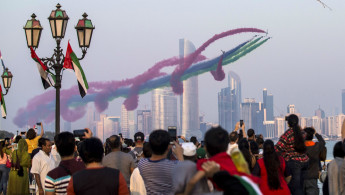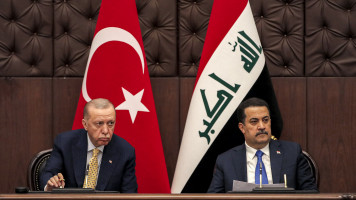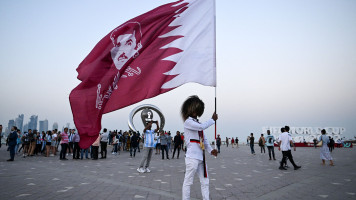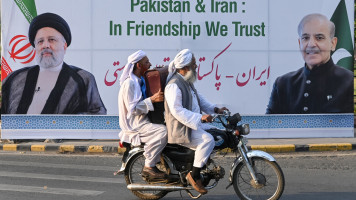Power, passports and privilege: the state of the UAE
"On our glorious National Day, our accomplishments continue… the Passport Index ranked the UAE passport as one of the top internationally... [it] opens the doors of the world to the people of the UAE. Congratulations to the UAE," he tweeted
It was a timely announcement of the country's global prestige, on the eve of the UAE's 47th National Day, when the country's achievements and progress are traditionally flaunted.
Through Abu Dhabi's ownership of English Premier League team Manchester City, and the UAE's own reputation as an A-list holiday destination, the country has sought to establish itself as a major world power.
Holding the world's "most powerful passport" is viewed as an acknowledgement of the UAE's status of global privilege for its nationals - particularly when citizenship is viewed as the ultimate, but unlikely, goal of many of the country's 8 million expatriates.
But the ranking is just one of four major indexes that ranks the world's passports, with Henley's Passport Index (HPI) - one of the best respected - placing the UAE at a lower, but still respectable, 21st position.
Henley's stated that Emiratis have visa-free access to 161 destinations around the world, rather than the Passport Index's 167, but acknowledged its rankings were not live.
HPI also said it judges which countries are considered visa-free according to a different set of benchmarks.
"HPI is focused on measuring visa-free travel in its truest sense; for instance once should differentiate between e-visa with visa-on-arrival," the group told The New Arab in a statement.
"We consider 227 travel destinations because certain territories (like American Samoa) have different conditions for entry than America itself. Basically, we make a distinction between semi-autonomous territories and states based on the reality of 'visa-free' access."
Passport rankings have become something of a national obsession in the UAE with local media zealously and regularly reporting on the country's progress through the passport rankings, culiminating in - like Manchester City - topping the table.
The news of was a cause for genuine excitement on National Day, where nationalism - and pride in the UAE's global status - has been mobilised in the face of numerous regional and local challenges.
 |
If George Orwell was alive today, he'd be writing about the UAE - Nick McGeehan, human rights researcher |
 |
"It's just another example of the UAE attempting to foster zealous and uncritical patriotism from its nationals, who are being told at every turn that the UAE is the happiest, most tolerant, and now the most welcomed nation in the world," said Nick McGeehan, a human rights researcher.
"[The story] is propagating the relentlessly positive narrative of the benevolent state. If George Orwell was alive today, he'd be writing about the UAE - perpetual war, omnipresent government surveillance and propaganda. This falls into the latter category."
And passports in the UAE are a privilege - not a right - with distinct differences for those who are "native" to the country, and naturalised Emiratis.
Citizenship can be revoked for, among other things, "insulting the ruler" - something that was used to punish a small group of "naturalised" Emiratis in 2012, after they signed a petition calling for an elected assembly.
This came amid other small acts of protest in the country during the 2011 Arab Spring, a pro-democracy movement that swept through the Arab world, until it was eventually held back by counter-revolutionary forces, including the UAE.
 |
The loss of citizenship has served as a particularly powerful weapon for the state to use to control dissent |  |
Abu Dhabi sought to quash calls for reform at home by jailing rebellious citizens, expelling others, and using the power of the passport to coerce the rest of the population into playing ball.
"The loss of citizenship has served as a particularly powerful weapon for the state to use to control dissent," scholar Karen Young wrote in a paper for LSE in 2015 about the UAE.
Different grades of citizenship and other forms of residency with the Bidoon at the bottom - stateless residents of the UAE who consider themselves Emirati, but are not recognised by the government.
Twitter Post
|
A number of Bidoon activists were arrested in 2012 after calling for nationality, given passports from the small Indian Ocean state of Comoros (ranked 162nd in the world, according to the Passport Index) and exiled from their home nation.
"It's just another repressive tool in [the government's] armoury. Bahrain has used this tactic more often, but it's been used by the UAE too," McGeehan added, who recently wrote an expose on Abu Dhabi-owned Manchester City and the UAE's aggressive campaign in promoting its image abroad.
Yet the recent jailing of British academic Matthew Hedges and its role in the disastrous war in Yemen - the poorest country in the Arab world - have been set-backs for Abu Dhabi's global PR campaign.
The situation of the Bidoon, living in the shadows of Emirati society - often illegally - is less well-known.
The UAE has sought to address this problem by giving more than Emirati Bidoon passports from Comoros over the past decade. Amnesty International believes that between 15,000 and 48,000 Emirati Bidoon were given passport.
It granted them an identity and allowed them to attend schools and work, but denied them the services and privileges available to other Emiratis.
"The UAE attempted to paper over the problem of its stateless population in 2008 by paying the Comoros Islands large sums of money to issue Comoran passports to the Bidoon," a spokesperson from the group told The New Arab.
Many from the UAE's population come from descendants of migrants several generations back, while others are native to the Arabian Peninsula. None have any social or historical connection to the Comoros Islands, Amnesty International noted.
The passports they were given granted them neither Emirati nor Comorian citizenship, and the move was essentially only a partial acknowledgement of their rights - and a travel document at best - according to the rights group.
"While [the granting of passports] did have temporary benefits both in creating a record of the Emitari Bidoons' existence and in allowing them to travel... it carried limited and temporary benefits but nothing akin to obtaining nationality or citizenship," Amnesty added.
Among the Bidoon community is online activist Ahmed Abdul Khaleq, who was arrested in 2012, given a Comoros passport and banished to Thailand.
"His case demonstrates this phenomenon well. Himself a member of the Bidoon, when Abdul Khaleq publicly criticised the UAE government for its treatment of the stateless population, he was detained and ultimately forced into exile."
Each passport was said to have been sold to the UAE for around $4,500, according to The New York Times, with Moroni gaining at least $228 million from the sales since 2008.
The money generated from the sale of the Comoros passports was earmarked to fund development in the impoverished Indian Ocean state, with ideas of transforming it into a "new Dubai".
The promised investments did not emerge and the sale of passports has been a national scandal in the archipelago state with a parliament report concluding that a mafia-like network involved in the scheme pocketed up to $100 million in public funds going missing over the years.
Former Comoros President Ahmed Abdallah Mohamed Sambi was charged with graft and embezzling public money this year over the sale of the passports to Kuwait and the UAE, while the Moroni government eventually annulled the passport legislation.
With the passports of the Emirati Bidoon beginning to expire - and due to the political sensitivities at the moment in the Indian Ocean state - they could soon become stateless again, with their limited privileges curtailed.
"These people have almost no rights and are easily subject to governmental coercion."



